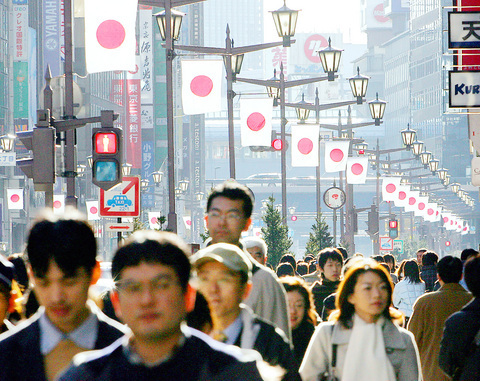Asia's biggest stock exchange finished its final day of trading for the year yesterday on a high note, with stocks rallying to cap a year, during which the benchmark gained 7.6 percent on hopes Japan's economy is on a rebound.
Tokyo Stock Exchange shares closed higher across a broad range of sectors, including banking, retail and export-related issues, as traders and guests clapped hands rhythmically to close the year according to Japanese tradition after a half-day session. The yen was up against the US dollar.

PHOTO: AFP
The Nikkei Stock Average was up 107.20 points, or 0.94 percent, closing the year at 11,488.76 points -- the best finish for the blue-chip index since July 13, when it closed at 11,608.62 points. On Wednesday, the Nikkei lost 42.57 points, or 0.37 percent.
The dollar bought ?103.73 at 3pm yesterday, up ?0.51 from late Wednesday in Tokyo but below the ?103.80 it bought in New York later that day.
On the stock market, investors bought on expectations of a global economic recovery next year.
Technology issues Advantest Corp and Canon Inc and automakers Toyota Motor Corp and Honda Motor Co closed higher. Banks UFJ Holdings Inc and Mitsubishi Tokyo Financial Group Inc also rose, as did major retailer Ito-Yokado Co, as well as real estate Mitsui Fudosan Co.
Many market analysts expect the Nikkei index to rise gradually toward the latter half of next year as global economies recover and production and sales at Japan's major exporters begin to rise.
US Morgan Stanley equities strategist Naoki Kamiyama said if the market factors in the outlook for an end to deflation and a worldwide cyclical economic recovery, the Nikkei "will rise toward 13,000 toward the end of 2005."
Kamiyama said the next year will be the final year of Japan's structural reforms.
Some analysts say the danger of deflation -- or continually falling prices that brings down wages and profits that have plagued Japan for years -- may be over next year. Japan's central bank has kept interest rates virtually at zero for the past three years to help fight deflation.
This year, strong market hopes for an end to deflation helped the Nikkei index climb nearly 17 percent from a year-low of 10,365.40 reached on Feb. 10 to a year-high of 12,163.89 on April 26, but those hopes then gave way to the reality of a slow slide in prices.
For the whole year, the Nikkei gained 7.6 percent from the end of last year on signs the world's second-largest economy has been on the rebound for the last two years thanks to robust exports, especially to China and other Asian countries.

MAKING WAVES: China’s maritime militia could become a nontraditional threat in war, clogging up shipping lanes to prevent US or Japanese intervention, a report said About 1,900 Chinese ships flying flags of convenience and fishing vessels that participated in China’s military exercises around Taiwan last month and in January have been listed for monitoring, Coast Guard Administration (CGA) Deputy Director-General Hsieh Ching-chin (謝慶欽) said yesterday. Following amendments to the Commercial Port Act (商港法) and the Law of Ships (船舶法) last month, the CGA can designate possible berthing areas or deny ports of call for vessels suspected of loitering around areas where undersea cables can be accessed, Oceans Affairs Council Minister Kuan Bi-ling (管碧玲) said. The list of suspected ships, originally 300, had risen to about 1,900 as

Right-wing political scientist Laura Fernandez on Sunday won Costa Rica’s presidential election by a landslide, after promising to crack down on rising violence linked to the cocaine trade. Fernandez’s nearest rival, economist Alvaro Ramos, conceded defeat as results showed the ruling party far exceeding the threshold of 40 percent needed to avoid a runoff. With 94 percent of polling stations counted, the political heir of outgoing Costa Rican President Rodrigo Chaves had captured 48.3 percent of the vote compared with Ramos’ 33.4 percent, the Supreme Electoral Tribunal said. As soon as the first results were announced, members of Fernandez’s Sovereign People’s Party

MORE RESPONSIBILITY: Draftees would be expected to fight alongside professional soldiers, likely requiring the transformation of some training brigades into combat units The armed forces are to start incorporating new conscripts into combined arms brigades this year to enhance combat readiness, the Executive Yuan’s latest policy report said. The new policy would affect Taiwanese men entering the military for their compulsory service, which was extended to one year under reforms by then-president Tsai Ing-wen (蔡英文) in 2022. The conscripts would be trained to operate machine guns, uncrewed aerial vehicles, anti-tank guided missile launchers and Stinger air defense systems, the report said, adding that the basic training would be lengthened to eight weeks. After basic training, conscripts would be sorted into infantry battalions that would take

GROWING AMBITIONS: The scale and tempo of the operations show that the Strait has become the core theater for China to expand its security interests, the report said Chinese military aircraft incursions around Taiwan have surged nearly 15-fold over the past five years, according to a report released yesterday by the Democratic Progressive Party’s (DPP) Department of China Affairs. Sorties in the Taiwan Strait were previously irregular, totaling 380 in 2020, but have since evolved into routine operations, the report showed. “This demonstrates that the Taiwan Strait has become both the starting point and testing ground for Beijing’s expansionist ambitions,” it said. Driven by military expansionism, China is systematically pursuing actions aimed at altering the regional “status quo,” the department said, adding that Taiwan represents the most critical link in China’s